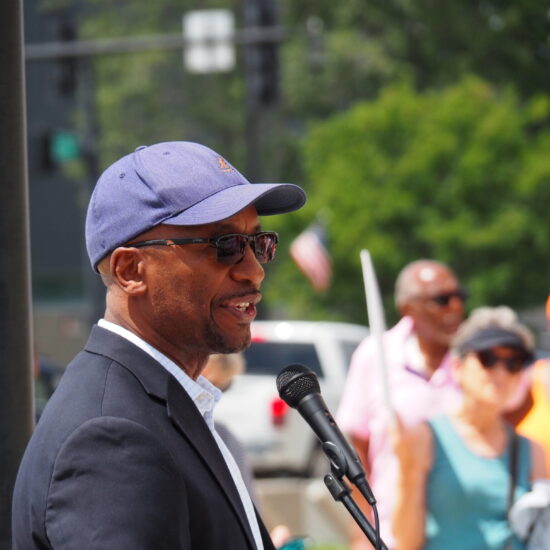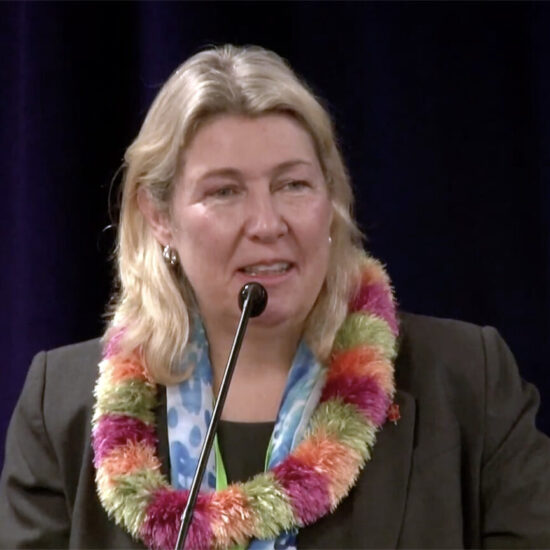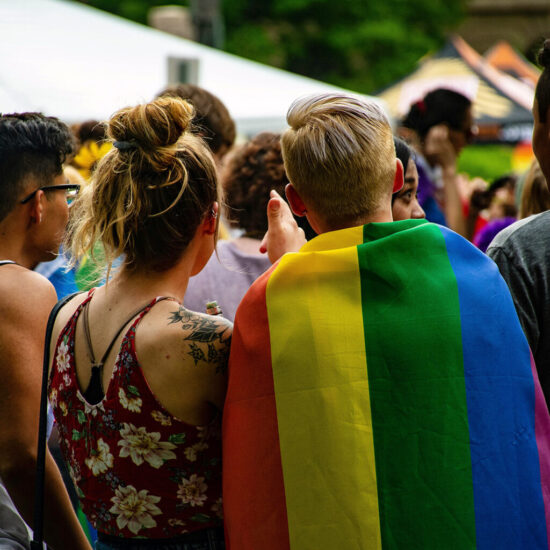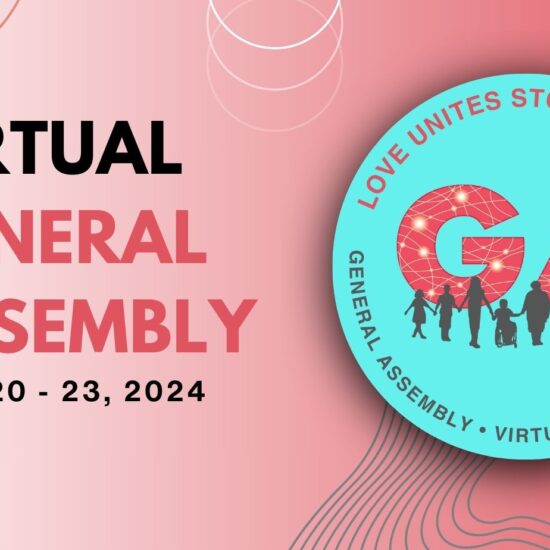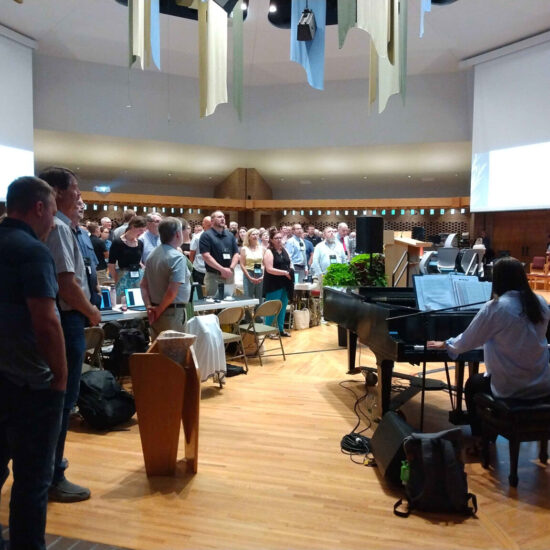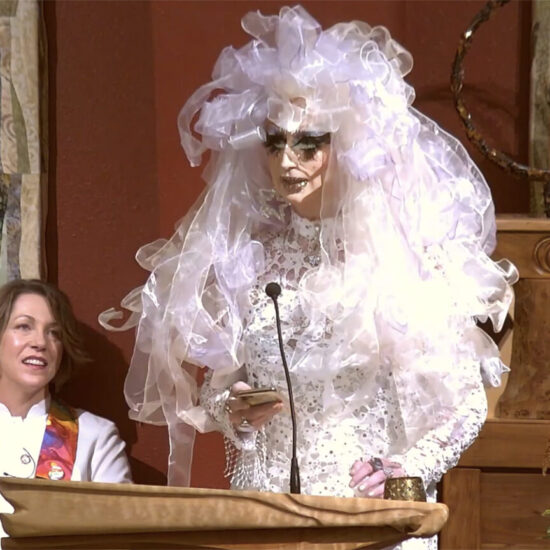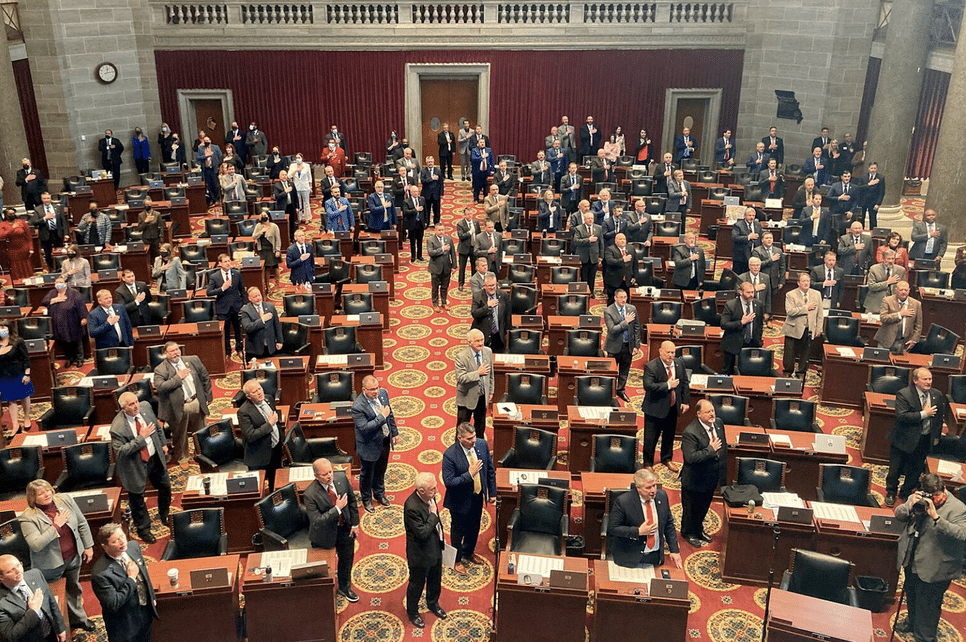

Members of the Missouri House of Representatives recite the Pledge of Allegiance as they begin their annual legislative session, Jan. 5, 2022, in Jefferson City, Missouri. (AP Photo/David A. Lieb, File)
(RNS) — Maharat Rori Picker Neiss is nervous now that her son can ride his unicycle on a high wire, a skill he honed pedaling up and down the streets of his Missouri neighborhood during the early days of the COVID-19 pandemic to bring a smile to the neighbors.
He loves entertaining people, the 11-year-old told Religion News Service in an interview by phone, because he likes to see their faces, which look “like a happy kind of impressed.”
He watches the faces of state lawmakers when he testifies against legislation that impacts transgender children like him, too — like he did last week when he spoke to a Missouri House of Representatives committee about the impact of six bills making their way through the chamber that would limit medical care and athletic participation for transgender children.
They don’t exactly look happy or impressed. Some look bored. Some do “that kind of thing when you’re, like, nodding along and like, ‘I understand. I feel you.’
“I tried to make it, like, very clear that this bill would hurt kids,” said the boy, who asked not to be named.
He was accompanied by his mother — whose title “maharat” denotes a female rabbi — and other faith leaders, as well as at least two dozen members of Missouri’s Jewish community, all opposed to the legislation.
“Basically, Missouri is leading the nation, it seems right now, in anti-LGBTQ legislation,” said Picker Neiss, executive director of the Jewish Community Relations Council of St. Louis.
Jewish and Christian clergy have taken an active role in protesting what one advocacy group has called the “most dangerous” session of the Missouri Legislature for the LGBTQ community it has seen in years.
All told, Missouri lawmakers have introduced 27 bills that the American Civil Liberties Union has deemed anti-LGBTQ — more than any other state in the group’s database.
Missouri’s bills make up about 21% of all legislation targeting the LGBTQ community that is currently being considered nationwide, according to a recent report in The Kansas City Star.
On Jan. 24, eight of those anti-LGBTQ bills came before the General Laws Committee of the Missouri House, while over in the Senate, the Education and Workforce Development Committee advanced another bill promoting parental rights that initially had included language barring transgender girls from participating in girls’ sports at public schools.
More than a half dozen clergy — predominantly Jewish — were at the Capitol in Jefferson City, Missouri, for the marathon hearing to testify against or otherwise show their opposition to the bills, according to Rabbi Daniel Bogard of Central Reform Congregation in St. Louis.
Some are back this week to lobby lawmakers and to testify as Missouri’s Senate Emerging Issues Committee holds a public hearing on additional bills restricting transgender athletes’ participation in sports.
“I think one of the most distinct parts about the resistance to these bigoted and bullying bills in Missouri is the way that the faith community has shown up to stand up for these kids,” Bogard said.
The Rev. Mike Angell, rector of the Episcopal Church of the Holy Communion in University City, Missouri, said it’s important to many clergy to speak out about anti-LGBTQ legislation because their faith communities teach that LGBTQ people should be welcomed.
For some, the stakes are both professional and personal, Angell added.
“A number of us have trans youth in our congregations, some of whom are here to testify and to witness. So, for a lot of us, there’s a piece of this that is accompaniment of the trans youth, who would be directly affected, and the parents of trans youth, who would be directly affected.” he said.
It’s personal, too, for state Rep. Justin Sparks, who sponsored a bill that would create the Missouri’s Children Deserve Help Not Harm Act, health care professionals from providing — or any person or entity from aiding — gender-affirming care to anyone under the age of 18.
Sparks, a Republican who was recently elected to represent part of St. Louis County, said a family member identified as transgender before detransitioning, and he is concerned about any irreversible effects of medication or surgery on children should they also detransition.
“The demonization on one side — because I think some folks think that you are just out to hurt people, or be callous toward what they’re going through or that it’s some kind of moral or religious crusade — couldn’t be further from the truth,” he said.
Like Sparks, the sponsors of all six bills regarding transgender children heard by the General Laws Committee last week list their church memberships in their official House biographies. Two — state Reps. Brad Hudson and Brian Seitz — note that they are pastors in addition to their legislative roles.
But Sparks said that, rather than setting him on a crusade, his faith leads him to approach legislation “from a place of genuine concern from my heart.” It also teaches free will — that others are free to make decisions he disagrees with morally or spiritually — “but not until they’re an adult.”
Hudson, who sponsored a nearly identical bill, added, “I’m not unaware of the fact that there are individuals that would describe themselves as people of faith who disagree with me here, but I will say the vast majority of people of faith that I know agree with me on this.”
Bogard cites his own Jewish faith as a reason to oppose the same legislation: “To be a Jew is to remember that we were strangers in the land of Egypt, that we have been the oppressed.” The command to care for those who are likewise oppressed, he said, is found throughout the Torah.
“And who’s more vulnerable than trans kids in our world?” he said.
Like Picker Neiss, Bogard is the parent of a trans child and has been lobbying and testifying against similar bills for years, driving the more than two hours to Jefferson City as many as eight times one legislative session. First, there were the so-called bathroom bills, he said, then bills targeting student athletes.
The bills regarding gender-affirming care, he said, are the ones that keep him up at night.
Bogard worries that if they pass, he and his family might have to flee the state, leaving behind the home his grandfather built — the home where he and his father were both raised, and where he is now raising his children.
“I have a panic attack basically every night before I go down to (Jefferson City) now because you’re going to beg for your government not to come after you,” he said.
Picker Neiss said there also have been moments when she has seen her child and others empowered and encouraged to use their voices. “I feel like the big summary is sort of like we’re all scared and nervous and also feel incredibly loved and supported simultaneously,” she said.
The maharat, who also is part of an interfaith group of clergy that filed a lawsuit last month challenging Missouri’s strict abortion ban, said that both sides in Missouri’s transgender fight have offered religious arguments — but not always in a way she recognizes.
She’s stumped particularly by Christians who back up their support for the legislation with a passage from the biblical Book of Genesis that says that all people are made in the image of God. In Judaism, she said, the idea that people are made in the image of God underscores their diversity, helping faithful people to fathom “a little piece of God,” Picker Neiss said.
“The idea that people are different from one another, that they might be different than what we can comprehend, that’s not something we should be scared of,” she added. “That’s actually what brings us closer to the divine.”

